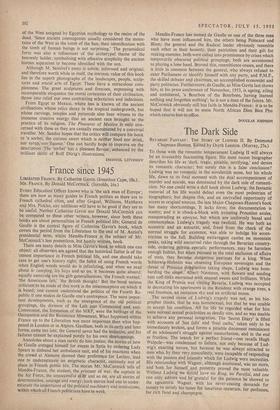France since 1945
EVERY Edwation Officer knows who is 'the sick man of Europe'; there are now as many guides to French politics as there are to French cathedral cities, and after Goguel, Williams, Matthews and Mrs. Pickles, any additions will have to be good if they are to be useful. Neither Catherine Gavin nor Donald McCormick can be compared to these other writers, however, since both these books are about personalities in French political life; General de Gaulle is the central figure of Catherine Gavin's book, which covers the period from the Liberation to the end of M. Auriol's presidential term, whilst Mendes-France is, the subject of Mr. McCormick's less pretentious, but hastily written, book.
There are many details in Miss Gavin's book to which one can object: all observers are agreed that the historical factor is of the utmost importance in French political life, and one should take care to get one's history right; the habit of using French words when English words would do is infuriating, and when we read about le camping, les boys and so on, it becomes quite absurd; equally annoying are the glib generalisations, 'the French wanted,' 'the Americans felt,' the British thought.' But the most serious criticism to be made of this work is the misconception on which it is based; one cannot understand the politics of the Fourth Re- public if one makes de Gaulle one's centrepiece. The most impor- tant developments, such as the emergence of the old political groupings, the division of the Left into Communist and anti- Communist, the formation of the M RP, were the heritage of the Occupation and the Resistance Movement. What happened within France up to the Liberation was more important than what hap- pened in London or in Algiers. Gaullism, both in its early and later forms, came too late; the General never had the initiative, and his failures cannot be explained' purely by his own shortcomings.
Anecdotes about a man rarely do him justice; the stories of how de Gaulle avenged himself for events in Syria by ordering Lady Spears to disband her ambulance unit, and of his reactions when the crowd at Alengon showed their preference for Leclerc, lead one to underestimate an enigmatic character, curiously out of place in French public life. The stories Mr. McCormick tells of Mendes-France, the student, the prisoner of war, the captain in the Air Force, the unsuccessful skier and so on, are all stories of determination, courage and energy; such stories lead one to under- estimate the importance of the political machinery and institutions, within which all French politicians have to work. Mendes-France has named de Gaulle as one of the three men who have most influenced him, the others being Poincar6 and Blum; the general and the Radical leader obviously resemble each other in their honesty, their patriotism and their gift for making enemies; both were called into prominence by crises which temporarily obscured political groupings; both are accustomed to playing a lone hand. Beyond this, resemblance ceases, and there is little in common between the general, who always refused to enter Parliament or identify himself with any party, and P.M.F., the skilled debater and chairman, an accomplished economist and party politician. Furthermore, de Gaulle, as Miss Gavin last shows him, at his press conference of November, 1953, is ageing, ailing and embittered, 'a Bourbon of the Bourbons, having learned nothing and forgotten nothing'; he is not a man of the future. Mr. McCormick obviously still has faith in Mendes-France: it is to be hoped that it will not be some North African Dien Bien Phu which returns him to office.
DOUGLAS JOHNSON


































 Previous page
Previous page